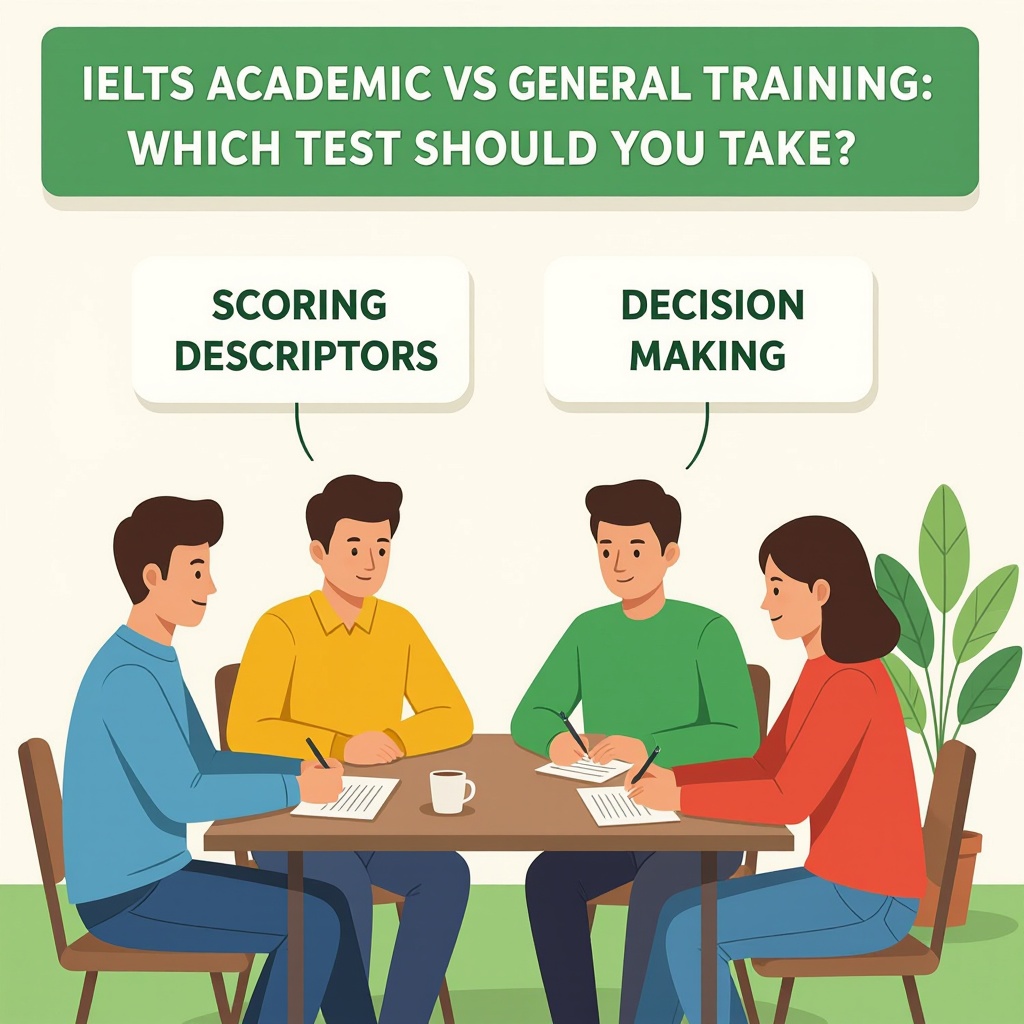Selecting the right IELTS test version—Academic or General Training—depends largely on your educational, professional, or immigration goals. The Academic version caters to those aiming for higher education and professional certifications, while the General Training version suits individuals focusing on secondary education, work experience, or immigration processes.
Key Takeaways
- The IELTS Academic test suits university admissions and professional registrations, requiring you to handle complex academic materials.
- The IELTS General Training test emphasizes practical, everyday communication skills, perfect for those targeting immigration or job opportunities.
- Both tests have the same Listening and Speaking sections, but differ in the depth and content of the Reading and Writing sections.
- Globally, over 11,000 organizations recognize IELTS scores, so it’s crucial to choose the test type that aligns with your specific objectives.
- Verify any test requirements from institutions or immigration authorities to ensure your choice supports your application or goal effectively.
Understanding Purpose and Audience: Choosing the Right IELTS Test
The main factor in selecting between IELTS Academic and General Training is the intended use of the test scores. IELTS Academic is specifically designed for university admission and professional registration. It’s commonly sought by higher education institutions and professional bodies to ensure candidates can handle the rigors of academic life and professional standards. On the other side, IELTS General Training is aimed at immigration, secondary education, and work experience requirements. This version focuses more on everyday language skills.
There are over 11,000 organizations globally that recognize the IELTS certification, so it’s crucial to choose the version aligning with your goal. Whether you’re planning to attend a university, apply for a job, or migrate, knowing which test to take can save you time and effort. For instance:
- University admission: Opt for IELTS Academic to demonstrate your ability to communicate in an academic environment.
- Professional registration: An Academic version is required by many professional bodies.
- Immigration or secondary education: Select IELTS General Training for a focus on practical, everyday communication.
Visa and immigration applications often specify which IELTS version to take. Double-check these requirements to match your test choice. The wrong selection could affect your application process. For more detailed guidelines, you might want to visit the British Council’s official IELTS page. This will help ensure you’re on the right track to achieving your academic or career ambitions.

Exploring Test Structure and Format
Both the IELTS Academic and General Training exams span 2 hours and 45 minutes, consisting of four sections: Listening, Reading, Writing, and Speaking. While the Listening and Speaking components remain consistent across both tests, it’s the Reading and Writing sections where differences arise.
In the Reading section, the Academic test includes three long texts, often taken from books, journals, magazines, and newspapers. They’re typically more complex, requiring analytical skills. By comparison, the General Training Reading has more everyday language, with varied texts like advertisements, official documents, or instructions. This makes it more relatable to daily situations.
For the Writing section, Academic candidates face two tasks: describing visual information (e.g., graphs, diagrams) and an essay on an academic topic. The emphasis is on the ability to handle data and use a formal style. General Training examinees, on the other hand, write a letter—formal or informal—and an essay dealing with a general interest topic, focusing on simple communication.
While both tests share a unified structure, understanding these distinctive elements can help tailor your preparation strategy to fit your needs. For more on IELTS and its various components, the official IELTS website is a trusted source. Armed with this knowledge, selecting the right test version becomes clearer based on personal goals and circumstances.

Diving into Reading and Writing Differences
In “Academic vs General Reading,” the focus significantly shifts. Academic Reading presents complex texts intended for a university-level audience. These passages test comprehension of challenging material, preparing you for higher education’s demands. In contrast, General Reading is designed for everyday English proficiency. You’ll encounter texts like advertisements, magazines, and brochures.
When examining Writing Task 1/2, the differences are apparent. Academic Writing requires interpreting and analyzing data. You’ll often deal with graphs, charts, or maps. It sharpens skills necessary for handling academic assignments.
On the other hand, General Writing centers on functional communication. Task 1 emphasizes letter writing, covering formal and informal styles. It’s about clear expression and practical use of language in everyday situations. Check out the IELTS official page for further details on these sections. These insights can be pivotal in your decision-making process.
Scoring, Band Descriptors, and Decision Making
Both the IELTS Academic and General Training tests use a 9-band scoring scale. This scale determines your proficiency level, from 1 (non-user) to 9 (expert user). It’s crucial to understand the specific band requirements set by educational institutions or immigration authorities. Use the “IELTS band descriptors” to gauge what your target band score involves.
When deciding which test to take, reflect on your educational aspirations or occupational needs. If you’re applying to a university, the Academic version is likely more suitable. For immigration purposes, the General Training test may meet requirements set by immigration authorities. Review the official IELTS website for more detailed guidance. Visit the British Council IELTS page for comprehensive insights into IELTS band descriptors and tailored preparation advice.

Evaluating Current Trends and Future Implications
I’ve noticed IELTS keeps its fundamental structures, yet its scoring approaches and difficulty levels are poised for change by 2025. Staying informed about these dynamic updates can give you an edge. Regularly checking “2025 IELTS updates” could offer insights into how these adjustments might impact both tests.
Additionally, it’s essential to be aware of shifts in immigration and education policies in countries such as Australia. These nations might alter their stance on IELTS enrollment and requirements, potentially broadening access or waiving the test under specific circumstances. For instance, using terms like “IELTS-free enrollment” could help you discover opportunities where the IELTS isn’t mandatory for visas or educational institutions (source).
Make sure you:
- Keep up with official IELTS announcements. These will highlight scoring or format changes.
- Track policy modifications in your target country. Key changes could directly impact your need for taking IELTS.
- Leverage online forums and groups where test-takers share real-time updates.
Staying on top of these trends and understanding future expectations will ensure your preparation is both comprehensive and relevant.

Which IELTS Test Suits Your Needs?
Choosing between Academic and General Training IELTS depends on your specific goals. Academic IELTS is best for those pursuing higher education or seeking professional validation. It’s perfect if you’re looking into university admission or professional registration. On the other hand, General Training IELTS meets the needs of practical, non-academic routes such as employment or immigration requirements.
Different institutions and countries might have varied test criteria. It’s essential to check these requirements to ensure compliance before booking your test. For further details on test types, consider visiting the official IELTS website. This will help you get a better understanding of what’s expected and how to prepare effectively.
Sources:
TerraTern – Blog Post: IELTS Academic vs. General
Infinity Training Institute (ifi.qa) – Blog Post: IELTS Academic vs. IELTS General Training: A Comprehensive Comparison
GeeksforGeeks – Article: IELTS Academic vs. General Tests
IELTS Liz – Article: IELTS GT Academic Writing Differences
IELTS.org – Webpage: IELTS Academic Test
IELTS.org – Webpage: Take a Test: Test Types
IDP IELTS – Article: Academic vs. General Training
Connetics USA – Blog Post: IELTS Academic vs. IELTS General
